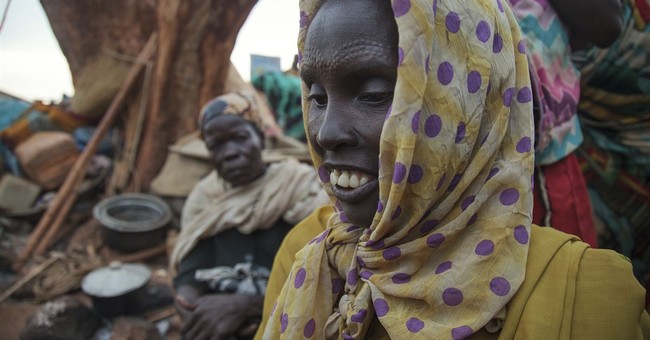Wars Where Starvation Is a Weapon

Right now 37 countries need "external assistance" to address their "food security" problems.
Let me translate from UN bureaucratese: severe food shortages threaten the survival of tens of thousands to several million human beings living in these 37 nations. In these hard corners, replenishing food stocks to avoid mass malnutrition or end a famine requires outside aid.
Twenty-nine of the countries on the list are in Africa; seven are in Asia. Impoverished Haiti is the other nation on the list.
The food shortages afflicting these countries vary in degree and duration. Each country has its own unique internal issues.
But credit the FAO for naming the biggest contributor to human starvation. "Civil conflict continues to be a main driver of severe food insecurity, triggering famine in South Sudan and putting populations at high risk of localized famine in Yemen and northern Nigeria."
Civil conflict and severe food insecurity? OK, more jargon. War is the real name, but famine is called famine.
Famine as a consequence of war is easy to understand. War displaces people from their homes. If refugees cannot return home quickly, or food aid is unreliable (or denied), then malnutrition results.
Warfare disrupts transportation services and destroys transportation infrastructure. Movement in general is dangerous and difficult, including supplying food and medicine.
War makers may also intentionally disrupt agriculture.
Yemen's famine appears to be an incidental consequence of its ongoing war. Iran and Saudi Arabia back opposing Yemeni factions. Anarchic conditions have disrupted food production and transport. The FAO estimates 17 million Yemenis are "food insecure" (lack access to sufficient food) and require assistance. Iraq's war with the Islamic State has put 2.4 million people in the same "food insecure" category. Most of these people have fled the fighting. Their needs overwhelm aid agencies.
However, South Sudan's famine is the double whammy. In South Sudan life-threatening hunger is a consequence of the war, but it also serves as a purposeful weapon of mass destruction.
At its core, South Sudan's civil war is a war between the Dinka and Nuer tribes. South Sudan's government (located in Juba) is dominated by Dinka. The government intentionally hinders food deliveries to rebel-held areas. Unfortunately, many smaller ethnic groups and communities, trapped between the Dinka and Nuer, now face famine conditions.
Bashir's regime continues to employ food as a weapon in its ongoing war against rebels in the "Two Areas," Blue Nile and South Kordofan states. The evidence is overwhelming that Khartoum systematically denies humanitarian aid to bona fide recipients.
The FAO's report blamed "conflict and civil insecurity for Sudan's food crisis in the Two Areas and in Darfur. All told, some 2.8 million people in Sudan require assistance.
North Korea is on the FAO's list. Unfortunately, The FAO pulls its punch to the point of cowardice, describing North Korea's food shortage as "Widespread Lack Of Access" due to "Low agricultural output and economic downturn."
Stalinism definitely creates an extended economic downturn. Kim Jong Un's sociopathic regime uses famine as a weapon to oppress its own people and as a financial resource. Instead of spending money on fuel, tractors and improved irrigation systems, Pyongyang builds ballistic missiles and nuclear weapons. This is a case where despotism directly connects to malnutrition.

No comments:
Post a Comment